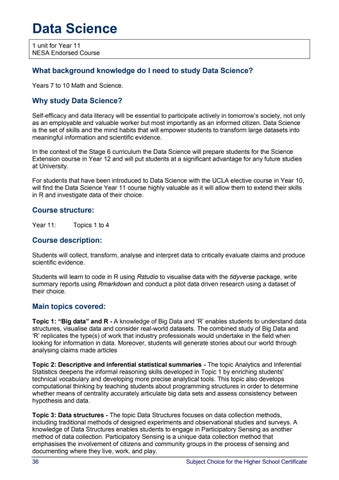Data Science 1 unit for Year 11 NESA Endorsed Course
What background knowledge do I need to study Data Science? Years 7 to 10 Math and Science.
Why study Data Science? Self-efficacy and data literacy will be essential to participate actively in tomorrow’s society, not only as an employable and valuable worker but most importantly as an informed citizen. Data Science is the set of skills and the mind habits that will empower students to transform large datasets into meaningful information and scientific evidence. In the context of the Stage 6 curriculum the Data Science will prepare students for the Science Extension course in Year 12 and will put students at a significant advantage for any future studies at University. For students that have been introduced to Data Science with the UCLA elective course in Year 10, will find the Data Science Year 11 course highly valuable as it will allow them to extend their skills in R and investigate data of their choice.
Course structure: Year 11:
Topics 1 to 4
Course description: Students will collect, transform, analyse and interpret data to critically evaluate claims and produce scientific evidence. Students will learn to code in R using Rstudio to visualise data with the tidyverse package, write summary reports using Rmarkdown and conduct a pilot data driven research using a dataset of their choice.
Main topics covered: Topic 1: “Big data” and R - A knowledge of Big Data and ‘R’ enables students to understand data structures, visualise data and consider real-world datasets. The combined study of Big Data and ‘R’ replicates the type(s) of work that industry professionals would undertake in the field when looking for information in data. Moreover, students will generate stories about our world through analysing claims made articles Topic 2: Descriptive and inferential statistical summaries - The topic Analytics and Inferential Statistics deepens the informal reasoning skills developed in Topic 1 by enriching students' technical vocabulary and developing more precise analytical tools. This topic also develops computational thinking by teaching students about programming structures in order to determine whether means of centrality accurately articulate big data sets and assess consistency between hypothesis and data. Topic 3: Data structures - The topic Data Structures focuses on data collection methods, including traditional methods of designed experiments and observational studies and surveys. A knowledge of Data Structures enables students to engage in Participatory Sensing as another method of data collection. Participatory Sensing is a unique data collection method that emphasises the involvement of citizens and community groups in the process of sensing and documenting where they live, work, and play. 36
Subject Choice for the Higher School Certificate





